My toes first tickled desert sands last September when days averaged 40° Celsius. Unless you’ve endured this heat on an ongoing basis (which I hadn’t), it hits you like a train. Leaving the coolness and comfort of your air-conditioned home feels like stepping into an oven: you can’t wait to get out of it. Rapidly you adopt a habit of turning on the air con at least 10 minutes before you sit into your car or the seat will scald your legs and your behind and the lack of oxygen will leave you gasping for breath. Time spent outdoors is a race against the clock as from 10am to 4pm you morph into a vampire, hiding from the daylight. Sounds awful? Well, having spent a month at home in Ireland for Christmas, relatively speaking, there are a great many positives. It’s beach weather all year around and the cooler winter sun is perfect for swimming and sunbathing as temperatures rarely break 30°. In summer, very few can handle the beach until the mercury drops below 35 in the afternoon, but when the sun is lower in the sky, the cooling sea breeze is a welcome antidote to the scorching temperatures. The water is tepid and the white sand is fine and velvety soft.
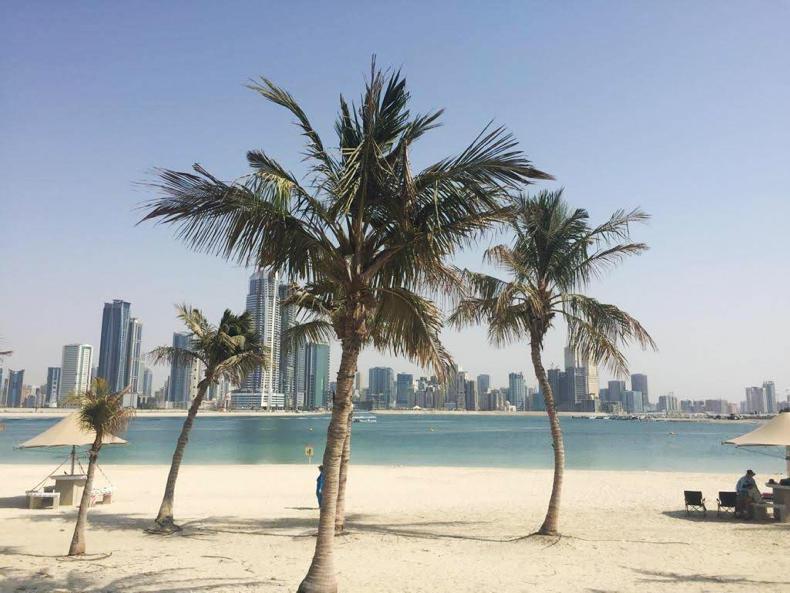
The weather in the UAE is a lot different to Co Laois, where Yvonne Kerr grew up.
The first 24 months of my son Gabriel’s life have been peppered with more airport transfers and overseas travel than I could only have imagined in the first 15 years of my own life. He already has two passports – for Ireland and New Zealand– and now a residency visa for the United Arab Emirates (UAE) too. My toddler years were spent on a dairy farm in Ballyfin, Co Laois. I don’t think I needed a passport until I went on my first overseas school trip to Bulgaria aged 16. Before that, my longest trip would have been on a bus to visit Fota Wildlife Park in Cork. My three siblings – two brothers and one sister – were older (I may have been a mistake) and at school when I was still in nappies, so until I started primary school, I spent lots of time alone, reading Enid Blyton novels and Ladybird books, rambling the fields, helping my dad on the farm: a tomboy. I have vivid memories of sitting in the cab of our red 1965 Massey Ferguson – still going strong would you believe – legs dangling, bumping along rough farm tracks as Dad ploughed or tilled or checked on stock. On the happiest days, Dad sang; The Auld Woman from Wexford still brings a smile to my face. It was a peaceful, rustic upbringing that was poles apart from the adventurous, voyaging life that our son is leading and the same will be true I’m sure for baby number two.
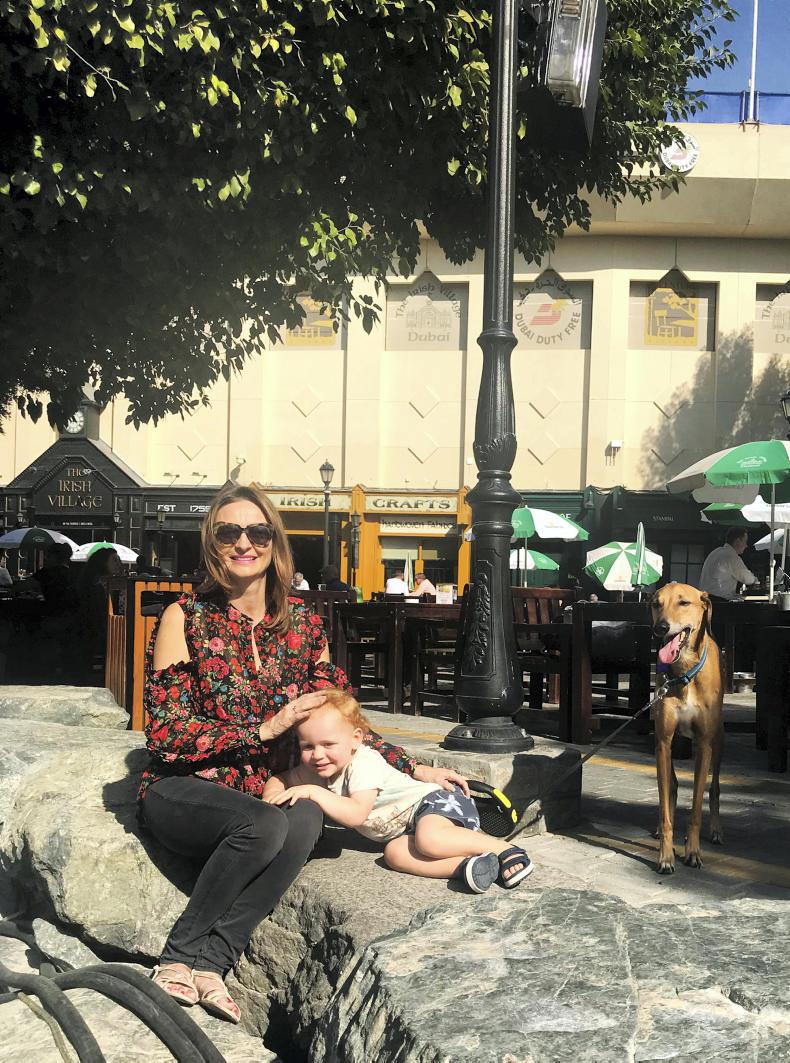
Yvonne Kerr with her son Gabe at the Irish village in Dubai.
We live on the grounds of a private Australian school, on the border of Sharjah and Dubai, where my husband Antony teaches, sharing a residential area with 100 other teachers, mostly expats from Australia, New Zealand and South Africa. We open our door to Ramsay St (yes, just like the street from Neighbours) and Gabe runs out to play with roughly 30 other kids aged from one to 12 years. As one of the youngest, he is adored by the older children, who take him under their wing, jump with him on the trampoline and race him on their scooters. He is the only white child in his nursery class – the children and teachers are mostly Emirati, Indian or Filipino – and I think this is just the most fantastic life lesson at such a young age, to stand out with his porcelain skin and ginger curls and thus learn that life is not just one race, class or colour.
Why did we move here? Tax and rent-free living - the main draw for most expats. Prior to this we lived in Auckland, New Zealand for five years where we paid exorbitant rent and sky-high food prices making it difficult to save money once we had a baby and nursery fees to pay, even on two salaries. No tax or rent means we can live off one salary, lending us a new lease of life. Now that we’re expecting our second baby in August, that breathing space is crucial. Another major plus for me personally is living one flight away from friends and family at home. Yes, Dubai is still seven hours on a plane from Dublin, but compared to the 32-hour journey from New Zealand to Ireland, it’s a doddle.
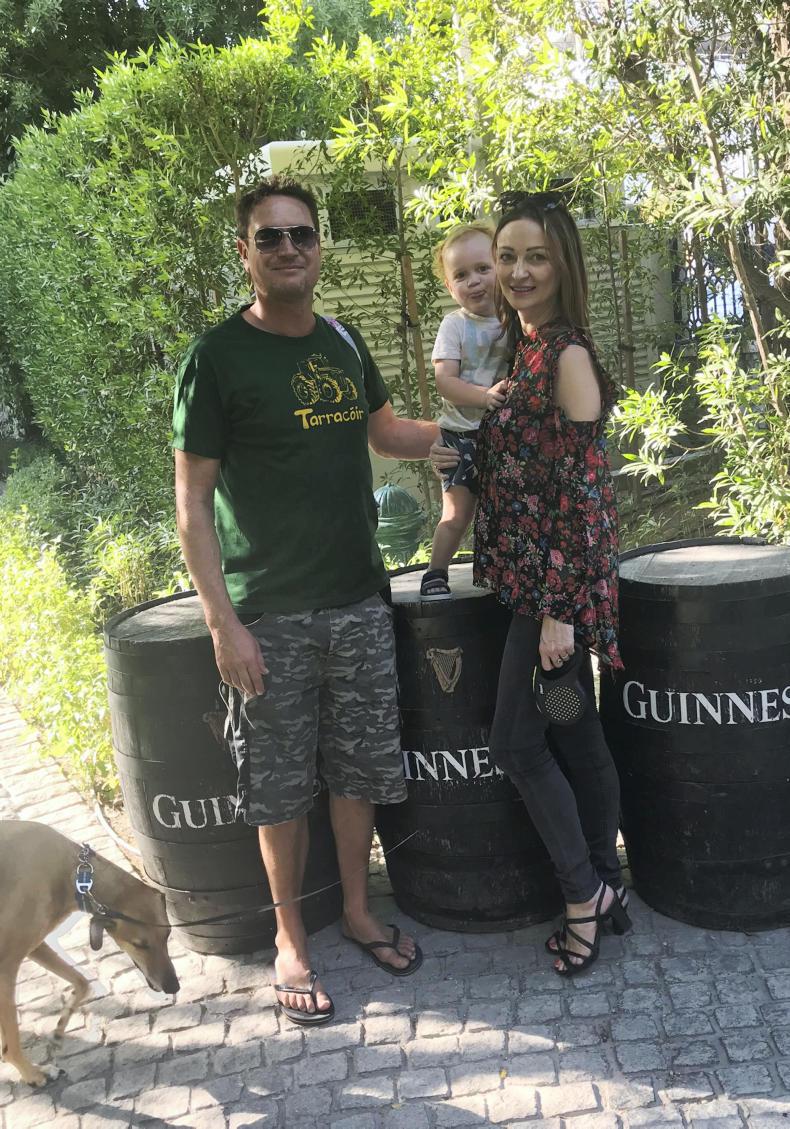
Yvonne Kerr with her husband Antony Paine and their son Gabe at the Irish village in Dubai.
The Muslim culture wastes no time in reminding you that you are a visitor to these lands. Starting at 5.15am, the five-times daily Islamic call to prayer – the Salat – is broadcast via loudspeakers from a local mosque and something that seemed so alien to me has now become part of my day too. I’ve grown to appreciate its customary importance as a reminder for Muslims to be ever conscious of their God Allah, and I find the melodious call, not dissimilar to the chanting of medieval monks, strangely meditative and calming.
The most obvious variance between expats and Emiratis is their dress code. Women wear a black abaya – a simple, loose cloak – some with heads and faces covered by a niqab, some not – while men don a white version of the same. Men sometimes cover their heads but not their faces. Once you learn that this Muslim code exists not to disrespect women but to free them from harassment and judgement, it becomes just another significant cultural aspect of a different world.
We have yet to experience what the desert has in store for us over the summer (when I will be heavily pregnant - pray for me), which will obviously restrict our outdoors movement, but with an abundance of water parks, play centres and even a ski slope housed indoors in the shopping malls of Dubai half an hour away, we’re not short of options. Gabriel won’t be roaming the farm as I did at his age, but he has visited the farm in Ballyfin on three occasions already so rest assured, he is well versed in the difference between a camel and a cow.
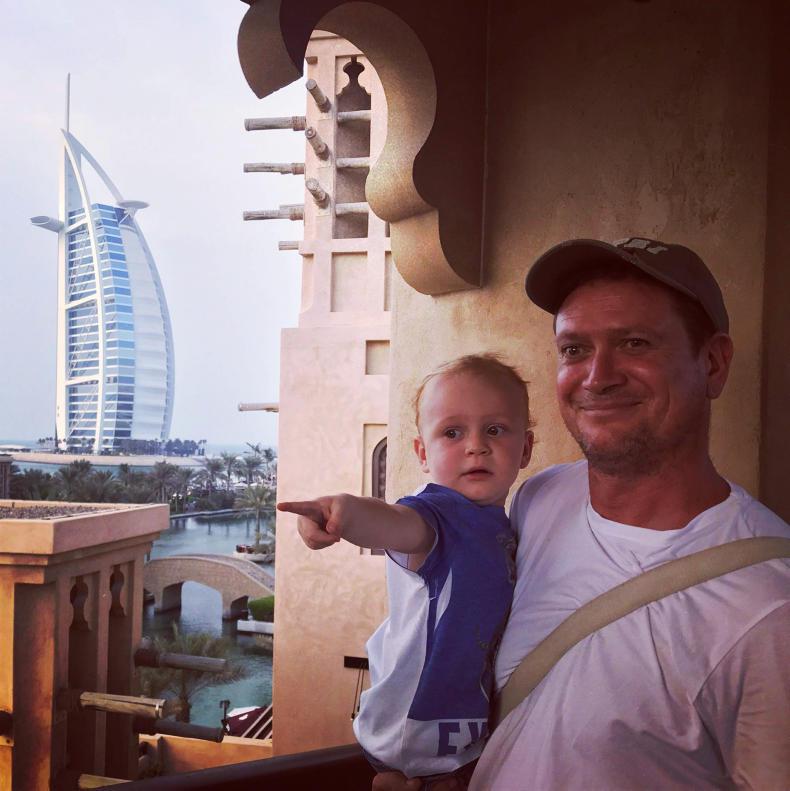
Yvonne Kerr's husband Antony Paine with their son Gabe.
Once you live here, shadows start to fall over the extravagance and grandeur of the UAE. Of the 9.4 million inhabitants that make up the seven emirates of this Arabian Peninsula nation, about 70% are low-paid migrant labourers from countries such as India, Indonesia and the Philippines, working in construction or retail, or as maids, nannies and taxi drivers.
Under the kefala system used in Gulf countries such as the UAE, unskilled foreign workers must have a sponsor, usually their employer, who is responsible for their visa and legal status. In my own case, my sponsor is my husband, but for less fortunate migrants, this sponsorship requirement opens the door for exploitation. The kefala system is widely criticized by international human rights organisations and undercover investigations have reported crowded, unsavory and abusive working and living conditions and of passports being confiscated once workers enter the country, even though this is illegal.
Under Islamic law, ‘zina’ – sex outside marriage and adultery - is considered a serious crime and punishable by jail. The Guardian reported recently that unmarried migrant workers who fall pregnant in the UAE are forced to hide their children away for fear of being deported or locked up.
These children have no access to education or health services. They have no birth certificate or other identification. Officially, they do not exist. It’s an open sore on what is the glossy, manicured skyline of cities such as Dubai and Abu Dhabi, especially tourist attractions such as the Burf Khalifa, the world’s tallest building, built in desert temperatures by these very immigrants.
New labour laws, passed since 2016 to protect workers’ rights and regulate pay, sick leave and holidays are a step in the right direction, but discrimination is rife.
Other rules that expats must be aware of; swearing and foul language is considered obscene; drinking alcohol is allowed only on licensed premises, but drinking irresponsibly or to excess is seriously frowned upon. If you are caught drunk in a public space or in a taxi, you could be hit with a fine of up to 20,000AED (€5,000) or even thrown in jail.
While booze regulations are relaxed in Dubai where bars offer happy hours and bottomless brunches, where we live – on the border with neighbouring emirate Sharjah – is a dry state where alcohol is illegal. Of course expats have fun – communities wouldn’t be as vibrant otherwise - but discretion is key. The reality is such laws cannot be opposed by anyone, not even lawyers, as they derive from Sharia, an Islamic religious law.
Originally from a dairy farm in Laois, Yvonne Kerr was a reporter for Irish Country Living and deputy editor of Irish Country Magazine before moving to New Zealand in 2013. Last year, Yvonne moved with her Kiwi husband and two-year-old son to the UAE. The couple is expecting their second baby in August. She shares the story of her new life in the desert.
Try to imagine a place where rain is such a rarity that a moderately heavy downfall renders roads impassable, widespread flooding and school closures. If you’re from a farm in Ireland, as I am, where work carries on regardless even in the most torrential deluge, this seems unbelievable. But in the Middle East where roadside drains are backed up with billions of particles of desert sands, this is the reality. Welcome to the land of scorching, desiccating summers and hot winters, camel races and desert safaris. Welcome to my new home.
My toes first tickled desert sands last September when days averaged 40° Celsius. Unless you’ve endured this heat on an ongoing basis (which I hadn’t), it hits you like a train. Leaving the coolness and comfort of your air-conditioned home feels like stepping into an oven: you can’t wait to get out of it. Rapidly you adopt a habit of turning on the air con at least 10 minutes before you sit into your car or the seat will scald your legs and your behind and the lack of oxygen will leave you gasping for breath. Time spent outdoors is a race against the clock as from 10am to 4pm you morph into a vampire, hiding from the daylight. Sounds awful? Well, having spent a month at home in Ireland for Christmas, relatively speaking, there are a great many positives. It’s beach weather all year around and the cooler winter sun is perfect for swimming and sunbathing as temperatures rarely break 30°. In summer, very few can handle the beach until the mercury drops below 35 in the afternoon, but when the sun is lower in the sky, the cooling sea breeze is a welcome antidote to the scorching temperatures. The water is tepid and the white sand is fine and velvety soft.

The weather in the UAE is a lot different to Co Laois, where Yvonne Kerr grew up.
The first 24 months of my son Gabriel’s life have been peppered with more airport transfers and overseas travel than I could only have imagined in the first 15 years of my own life. He already has two passports – for Ireland and New Zealand– and now a residency visa for the United Arab Emirates (UAE) too. My toddler years were spent on a dairy farm in Ballyfin, Co Laois. I don’t think I needed a passport until I went on my first overseas school trip to Bulgaria aged 16. Before that, my longest trip would have been on a bus to visit Fota Wildlife Park in Cork. My three siblings – two brothers and one sister – were older (I may have been a mistake) and at school when I was still in nappies, so until I started primary school, I spent lots of time alone, reading Enid Blyton novels and Ladybird books, rambling the fields, helping my dad on the farm: a tomboy. I have vivid memories of sitting in the cab of our red 1965 Massey Ferguson – still going strong would you believe – legs dangling, bumping along rough farm tracks as Dad ploughed or tilled or checked on stock. On the happiest days, Dad sang; The Auld Woman from Wexford still brings a smile to my face. It was a peaceful, rustic upbringing that was poles apart from the adventurous, voyaging life that our son is leading and the same will be true I’m sure for baby number two.

Yvonne Kerr with her son Gabe at the Irish village in Dubai.
We live on the grounds of a private Australian school, on the border of Sharjah and Dubai, where my husband Antony teaches, sharing a residential area with 100 other teachers, mostly expats from Australia, New Zealand and South Africa. We open our door to Ramsay St (yes, just like the street from Neighbours) and Gabe runs out to play with roughly 30 other kids aged from one to 12 years. As one of the youngest, he is adored by the older children, who take him under their wing, jump with him on the trampoline and race him on their scooters. He is the only white child in his nursery class – the children and teachers are mostly Emirati, Indian or Filipino – and I think this is just the most fantastic life lesson at such a young age, to stand out with his porcelain skin and ginger curls and thus learn that life is not just one race, class or colour.
Why did we move here? Tax and rent-free living - the main draw for most expats. Prior to this we lived in Auckland, New Zealand for five years where we paid exorbitant rent and sky-high food prices making it difficult to save money once we had a baby and nursery fees to pay, even on two salaries. No tax or rent means we can live off one salary, lending us a new lease of life. Now that we’re expecting our second baby in August, that breathing space is crucial. Another major plus for me personally is living one flight away from friends and family at home. Yes, Dubai is still seven hours on a plane from Dublin, but compared to the 32-hour journey from New Zealand to Ireland, it’s a doddle.

Yvonne Kerr with her husband Antony Paine and their son Gabe at the Irish village in Dubai.
The Muslim culture wastes no time in reminding you that you are a visitor to these lands. Starting at 5.15am, the five-times daily Islamic call to prayer – the Salat – is broadcast via loudspeakers from a local mosque and something that seemed so alien to me has now become part of my day too. I’ve grown to appreciate its customary importance as a reminder for Muslims to be ever conscious of their God Allah, and I find the melodious call, not dissimilar to the chanting of medieval monks, strangely meditative and calming.
The most obvious variance between expats and Emiratis is their dress code. Women wear a black abaya – a simple, loose cloak – some with heads and faces covered by a niqab, some not – while men don a white version of the same. Men sometimes cover their heads but not their faces. Once you learn that this Muslim code exists not to disrespect women but to free them from harassment and judgement, it becomes just another significant cultural aspect of a different world.
We have yet to experience what the desert has in store for us over the summer (when I will be heavily pregnant - pray for me), which will obviously restrict our outdoors movement, but with an abundance of water parks, play centres and even a ski slope housed indoors in the shopping malls of Dubai half an hour away, we’re not short of options. Gabriel won’t be roaming the farm as I did at his age, but he has visited the farm in Ballyfin on three occasions already so rest assured, he is well versed in the difference between a camel and a cow.

Yvonne Kerr's husband Antony Paine with their son Gabe.
Once you live here, shadows start to fall over the extravagance and grandeur of the UAE. Of the 9.4 million inhabitants that make up the seven emirates of this Arabian Peninsula nation, about 70% are low-paid migrant labourers from countries such as India, Indonesia and the Philippines, working in construction or retail, or as maids, nannies and taxi drivers.
Under the kefala system used in Gulf countries such as the UAE, unskilled foreign workers must have a sponsor, usually their employer, who is responsible for their visa and legal status. In my own case, my sponsor is my husband, but for less fortunate migrants, this sponsorship requirement opens the door for exploitation. The kefala system is widely criticized by international human rights organisations and undercover investigations have reported crowded, unsavory and abusive working and living conditions and of passports being confiscated once workers enter the country, even though this is illegal.
Under Islamic law, ‘zina’ – sex outside marriage and adultery - is considered a serious crime and punishable by jail. The Guardian reported recently that unmarried migrant workers who fall pregnant in the UAE are forced to hide their children away for fear of being deported or locked up.
These children have no access to education or health services. They have no birth certificate or other identification. Officially, they do not exist. It’s an open sore on what is the glossy, manicured skyline of cities such as Dubai and Abu Dhabi, especially tourist attractions such as the Burf Khalifa, the world’s tallest building, built in desert temperatures by these very immigrants.
New labour laws, passed since 2016 to protect workers’ rights and regulate pay, sick leave and holidays are a step in the right direction, but discrimination is rife.
Other rules that expats must be aware of; swearing and foul language is considered obscene; drinking alcohol is allowed only on licensed premises, but drinking irresponsibly or to excess is seriously frowned upon. If you are caught drunk in a public space or in a taxi, you could be hit with a fine of up to 20,000AED (€5,000) or even thrown in jail.
While booze regulations are relaxed in Dubai where bars offer happy hours and bottomless brunches, where we live – on the border with neighbouring emirate Sharjah – is a dry state where alcohol is illegal. Of course expats have fun – communities wouldn’t be as vibrant otherwise - but discretion is key. The reality is such laws cannot be opposed by anyone, not even lawyers, as they derive from Sharia, an Islamic religious law.
Originally from a dairy farm in Laois, Yvonne Kerr was a reporter for Irish Country Living and deputy editor of Irish Country Magazine before moving to New Zealand in 2013. Last year, Yvonne moved with her Kiwi husband and two-year-old son to the UAE. The couple is expecting their second baby in August. She shares the story of her new life in the desert.
Try to imagine a place where rain is such a rarity that a moderately heavy downfall renders roads impassable, widespread flooding and school closures. If you’re from a farm in Ireland, as I am, where work carries on regardless even in the most torrential deluge, this seems unbelievable. But in the Middle East where roadside drains are backed up with billions of particles of desert sands, this is the reality. Welcome to the land of scorching, desiccating summers and hot winters, camel races and desert safaris. Welcome to my new home.











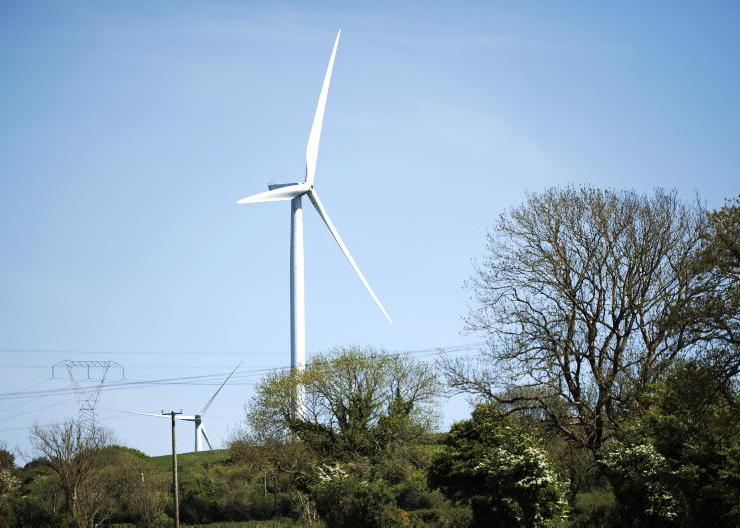
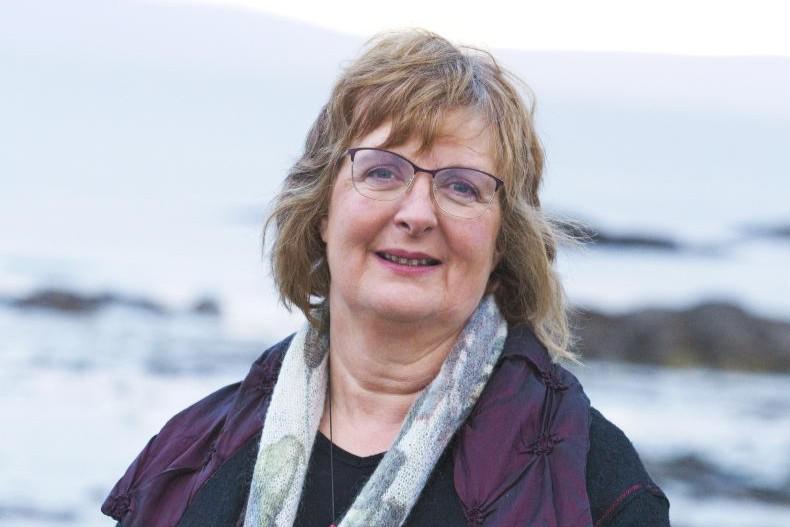
SHARING OPTIONS